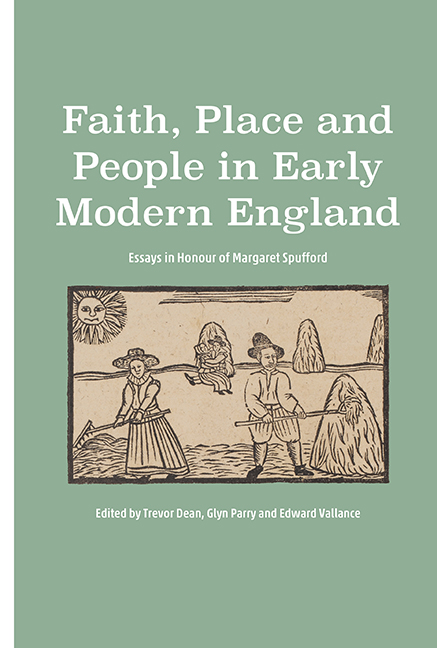Book contents
- Frontmatter
- Dedication
- Contents
- List of Illustrations
- List of Contributors
- Record Office Abbreviations
- Acknowledgements
- Introduction
- Margaret
- Part I Faith
- 1 Religious Divisions in the Localities: Catholics, Puritans and the Established Church before the Civil Wars
- 2 ‘Neither Godly professors, nor dumb dogges’: Reconstructing Conformist Protestant Beliefs and Practice in Earls Colne, Essex, c.1570–1620
- 3 The Sad Fortunes of the Reverend John Perkins: Scenes of Clerical Life in Late Seventeenth-Century England
- Part II Place
- Part III People
- Bibliography of Margaret Spufford's works
- Index
- Tabula in Memoriam
2 - ‘Neither Godly professors, nor dumb dogges’: Reconstructing Conformist Protestant Beliefs and Practice in Earls Colne, Essex, c.1570–1620
from Part I - Faith
Published online by Cambridge University Press: 19 July 2019
- Frontmatter
- Dedication
- Contents
- List of Illustrations
- List of Contributors
- Record Office Abbreviations
- Acknowledgements
- Introduction
- Margaret
- Part I Faith
- 1 Religious Divisions in the Localities: Catholics, Puritans and the Established Church before the Civil Wars
- 2 ‘Neither Godly professors, nor dumb dogges’: Reconstructing Conformist Protestant Beliefs and Practice in Earls Colne, Essex, c.1570–1620
- 3 The Sad Fortunes of the Reverend John Perkins: Scenes of Clerical Life in Late Seventeenth-Century England
- Part II Place
- Part III People
- Bibliography of Margaret Spufford's works
- Index
- Tabula in Memoriam
Summary
This chapter focuses on the other side of the parish from that explored so expertly and compellingly by Margaret Spufford in Contrasting Communities. Or rather, if Spufford sought out the first shoots of religious enthusiasm, and then went on to trace how the different plants were connected together by genus and over time, this research is more concerned to study the mud from which they emerged. We can say ‘mud’ rather than ‘soil’, because an acute agrarian historian like Spufford understood the distinction between tilled, aerated, well-manured, weed-free ‘soil’ or ‘tilth’, and the lumpen, muddy fallows, where things grow because they are left largely to their own devices. It is this rather unkempt, weed-strewn, parochial religion that is the subject under consideration here.
It will be investigated through the ‘classic’ parish study, of a kind so familiar to Spufford, but one in which we read the evidence against the grain, in search of the unexceptional and the hidden, rather than the zealous or the strident. Given this, we might as well pick a location in which the other story, of growing Protestant enthusiasm, has already been well told. It seems appropriate, therefore, to investigate the obverse of the rise of puritanism through an analysis based around the long clerical career of an incumbent of the well-known Essex village of Earls Colne. However, this incumbent was not the puritan clerical diarist Ralph Josselin, but his even longer-serving Elizabethan predecessor, William Adams. Adams was nominated to the vicarages of Earls Colne and neighbouring White Colne in 1573 and, although deprived of Earls Colne in 1610, he continued serving in White Colne (and living in Earls Colne) until his death in 1627. This total elapsed service of fifty-four years dwarfed even Josselin's commitment of forty-two years to the village.
If Josselin was a clergyman whose spiritual regime was one of endless, patient, painful cultivation, his predecessor was someone who was happy to let the spiritual weeds grow. However, in investigating the parish under Adams, it is important for us to avoid simply accepting the story told by his enemies and his successors, that the village was (in the words of its later firebrand lecturer, the puritan émigré Thomas Shepard) not a place ‘that had any godliness’, but rather a spiritual or normative tabula rasa until it was remodelled by the ‘hotter sort’.
- Type
- Chapter
- Information
- Faith, Place and People in Early Modern EnglandEssays in Honour of Margaret Spufford, pp. 43 - 69Publisher: Boydell & BrewerPrint publication year: 2018



